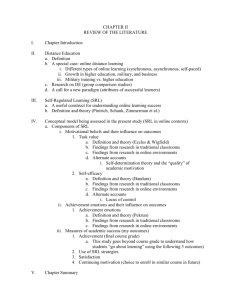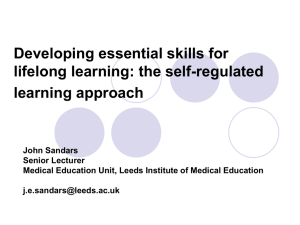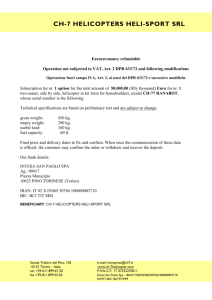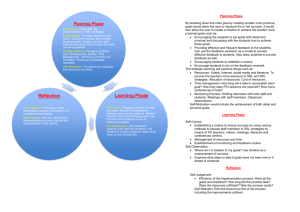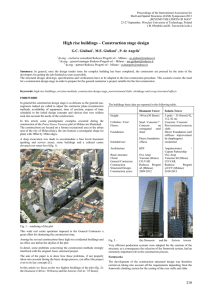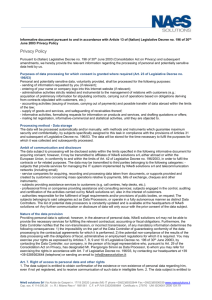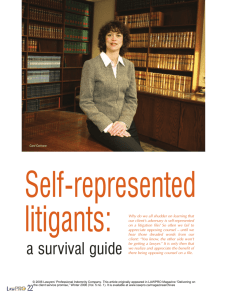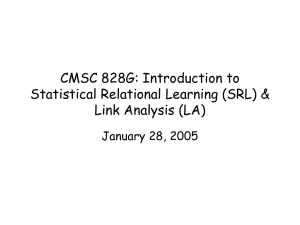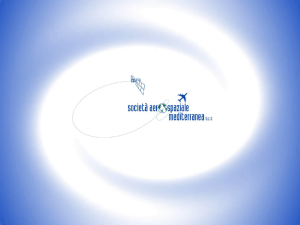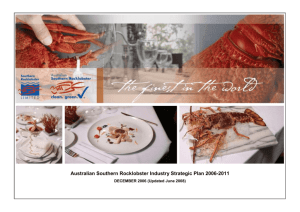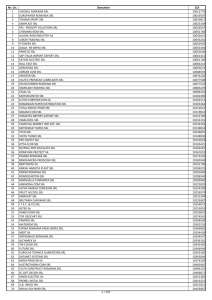Dylan Guarda`s Research Plan Title An Analysis of Student
advertisement
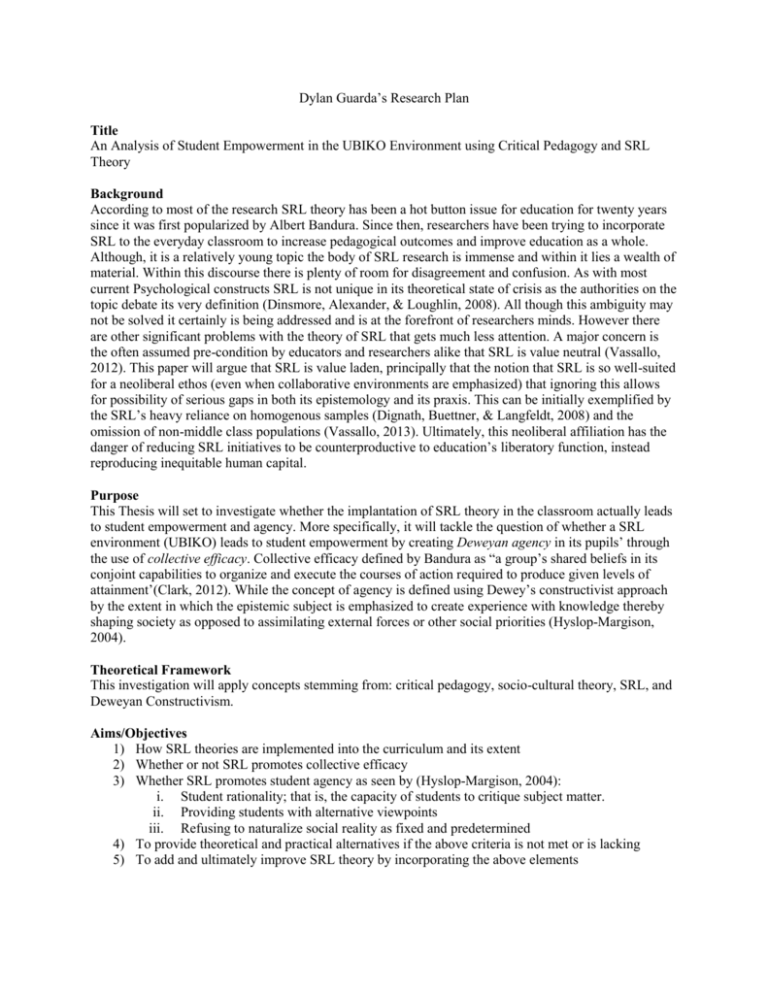
Dylan Guarda’s Research Plan Title An Analysis of Student Empowerment in the UBIKO Environment using Critical Pedagogy and SRL Theory Background According to most of the research SRL theory has been a hot button issue for education for twenty years since it was first popularized by Albert Bandura. Since then, researchers have been trying to incorporate SRL to the everyday classroom to increase pedagogical outcomes and improve education as a whole. Although, it is a relatively young topic the body of SRL research is immense and within it lies a wealth of material. Within this discourse there is plenty of room for disagreement and confusion. As with most current Psychological constructs SRL is not unique in its theoretical state of crisis as the authorities on the topic debate its very definition (Dinsmore, Alexander, & Loughlin, 2008). All though this ambiguity may not be solved it certainly is being addressed and is at the forefront of researchers minds. However there are other significant problems with the theory of SRL that gets much less attention. A major concern is the often assumed pre-condition by educators and researchers alike that SRL is value neutral (Vassallo, 2012). This paper will argue that SRL is value laden, principally that the notion that SRL is so well-suited for a neoliberal ethos (even when collaborative environments are emphasized) that ignoring this allows for possibility of serious gaps in both its epistemology and its praxis. This can be initially exemplified by the SRL’s heavy reliance on homogenous samples (Dignath, Buettner, & Langfeldt, 2008) and the omission of non-middle class populations (Vassallo, 2013). Ultimately, this neoliberal affiliation has the danger of reducing SRL initiatives to be counterproductive to education’s liberatory function, instead reproducing inequitable human capital. Purpose This Thesis will set to investigate whether the implantation of SRL theory in the classroom actually leads to student empowerment and agency. More specifically, it will tackle the question of whether a SRL environment (UBIKO) leads to student empowerment by creating Deweyan agency in its pupils’ through the use of collective efficacy. Collective efficacy defined by Bandura as “a group’s shared beliefs in its conjoint capabilities to organize and execute the courses of action required to produce given levels of attainment’(Clark, 2012). While the concept of agency is defined using Dewey’s constructivist approach by the extent in which the epistemic subject is emphasized to create experience with knowledge thereby shaping society as opposed to assimilating external forces or other social priorities (Hyslop-Margison, 2004). Theoretical Framework This investigation will apply concepts stemming from: critical pedagogy, socio-cultural theory, SRL, and Deweyan Constructivism. Aims/Objectives 1) How SRL theories are implemented into the curriculum and its extent 2) Whether or not SRL promotes collective efficacy 3) Whether SRL promotes student agency as seen by (Hyslop-Margison, 2004): i. Student rationality; that is, the capacity of students to critique subject matter. ii. Providing students with alternative viewpoints iii. Refusing to naturalize social reality as fixed and predetermined 4) To provide theoretical and practical alternatives if the above criteria is not met or is lacking 5) To add and ultimately improve SRL theory by incorporating the above elements Research Methods: Qualitative: Interviews and Observation Quantitative: Possibly use scales to measure variables depending on availability, including but not limited to: - Rating Scale to Observe Teachers’ Design of the Learning Environment (Dignath-van Ewijk et al,2013) - SRLTB Self-Regulated Learning Teacher Belief scale ( Lombaerts, 2009) as used by Dignath, et al 2012 - Assessing How Teachers Enhance Self-Regulated Learning (ATES) (Dignath-van Ewijk et al,2013) - Short and Rinehart's School Participant Empowerment Scale - 12-item Collective Efficacy Scale (Short Form) created by Goddard (2002) - Learner Empowerment Scale (LES) - Frymier, A. B., Shulman, G. M .. & Houser, M. (1996) - Students Collective Efficacy Scale (SCES) Sílvia Pina-Neves & Luísa Faria & Hannu Räty Time Table - Complete most of the primary research between March 17th and April 10th (If needed further primary research may be conducted in the fall) - Finish outline and rough table of contents by April - Write introduction and literature review in the summer months Expected Results - Through the literature review gaps in current SRL theory will be made explicit Hypothetical 1 - Despite the ‘ideal’ sample best fitted for traditional SRL theory the UBIKO environment shows gaps in empowerment through lack of agency and collective efficacy Hypothetical 2 - The UBIKO environment may show some of the gaps inherent in SRL although the negative effects are minimized and confounded due to other alternatives styles of teaching and the ‘ideal’ sample best fitted for traditional SRL theory If Hypothetical 2 becomes apparent in data analysis then I can compare data with a different teacher (in Canada) who does not use SRL theory yet has similar results as UBIKO but on disenfranchised youth. This will suggest that it is not the SRL theory per se but the care and attention to student empowerment. Ethics - Clear, open and transparent intentions Letter of intent and consent Debriefing after data is collected Share results/conclusion if participants desire Keep data safe for 2years after Thesis is complete Work Cited Clark, I. (2012). Formative Assessment: Assessment Is for Self-regulated Learning. Educational Psychology Review, 24(2), 205-249. doi: 10.1007/s10648-011-9191-6 Dignath, C., Buettner, G., & Langfeldt, H.-P. (2008). How can primary school students learn selfregulated learning strategies most effectively?: A meta-analysis on self-regulation training programmes. Educational Research Review, 3(2), 101-129. Dinsmore, D. L., Alexander, P. A., & Loughlin, S. M. (2008). Focusing the conceptual lens on metacognition, self-regulation, and self-regulated learning. Educational Psychology Review, 20(4), 391-409. Hyslop-Margison, E. J. (2004). Technology, Human Agency and Dewey's Constructivism: Opening Democratic Spaces in Virtual Classrooms. Australasian Journal of Educational Technology, 20(2), 137-148. Vassallo, S. (2012). Critical pedagogy and neoliberalism: concerns with teaching self-regulated learning. Studies in Philosophy and Education, 1-18. Vassallo, S. (2013). Considering class-based values related to guardian involvement and the development of self-regulated learning. New Ideas in Psychology, 31(3), 202-211. doi: http://dx.doi.org/10.1016/j.newideapsych.2011.12.002
